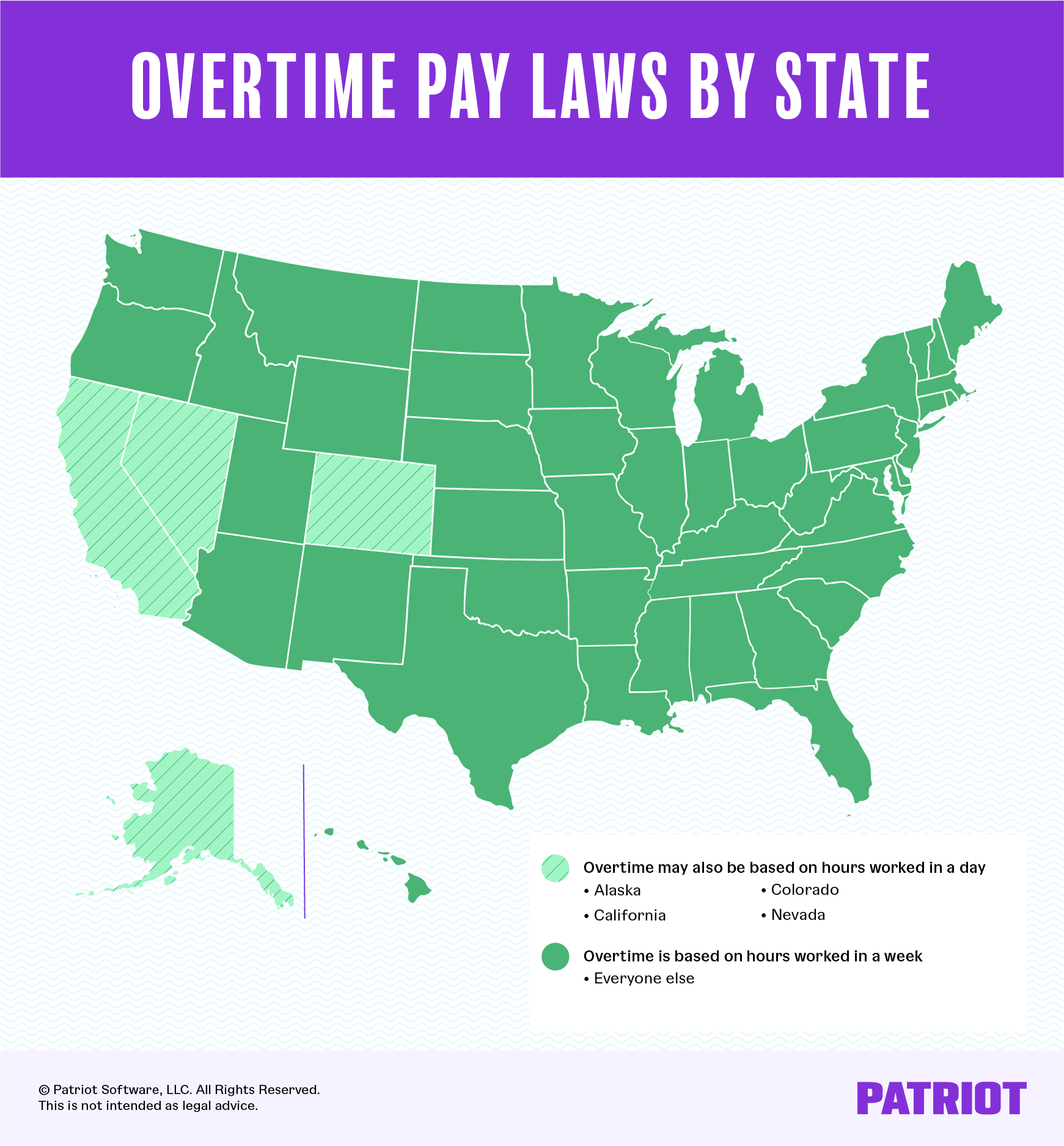Failing to pay eligible employees overtime is a wage violation that lands a number of employers in hot water each year. But if you thought federal overtime laws were the end of it, you’re in for a surprise. There are also overtime laws by state you may need to follow.
Should you follow federal or state law? What are the overtime regulations by state? Read on for the scoop.
What is the federal overtime law?
The Fair Labor Standards Act (FLSA) requires most employers to give nonexempt employees overtime pay when they work extra hours.
Overtime wages are 1.5 times an employee’s regular pay rate for each hour worked over 40 in a workweek. Under federal law, you must give overtime pay to your employees unless they have exempt status.
Employees are only exempt from overtime pay if they meet all three of the following requirements:
- Earning Level: The employee earns at least $35,568 annually ($684 per week)
- Salaried: The employee is paid on a salary basis
- Job Duties: The employee has job duties that are considered exempt (e.g., executive, administrative, or professional)
Keep in mind that there are other requirements for employees in certain fields, like outside sales or computers, that may have different exemption requirements. Consult the FLSA Fact Sheet for more information.
Overtime rules by state vs. federal overtime law
Although most employers are subject to the FLSA, there are some rare exceptions. The following are covered by the Fair Labor Standards Act:
- Businesses with $500,000 or more in gross annual sales
- Health- or education-oriented businesses
- Businesses formed as an activity of the government
- Enterprises engaged in interstate commerce in any way
Even if you don’t meet any of the first three FLSA provisions, you likely fall under the fourth: Enterprises engaged in interstate commerce. This covers businesses that make phone calls to other states or handle products that are moving between states. For example, if you receive products from out-of-state or produce products heading out-of-state, you’re probably subject to the FLSA.
Some state laws cover employees who aren’t covered under federal law. And, some state laws are stricter, triggering overtime pay if an employee works beyond a certain number of hours in a day.
So, which do you follow? Federal or state law? That answer depends on which law benefits your employees more. Always follow the law that is most beneficial to the employee, not the one most beneficial to your business’s budget.
Overtime pay laws by state: Map
The vast majority of states configure overtime pay using a workweek. However, some require overtime pay for hours worked beyond a certain number in a workday.
Use our map to determine which states set strict overtime laws for workdays:

Overtime laws by state
State laws can get intricate. And, not all states have a state-mandated overtime pay law—many states follow the federal law.
Take a look at a brief description of each state’s overtime rules (or lack thereof).
Alabama
Alabama does not have a state law for overtime pay. Instead, follow federal overtime rules.
Alaska
Alaska has a state overtime law.
Under Alaska’s state law, nonexempt employees receive overtime pay if they meet one of the following requirements:
- Work more than 40 hours in a workweek
- Work more than eight hours in a day
However, the state law does not apply to employers who typically employ fewer than four employees. And, there are a number of other exemptions, such as agricultural employees.
Arizona
Arizona does not specify a state overtime pay. Follow federal overtime rules.
Arkansas
Arkansas follows the federal overtime rules that require overtime pay for over 40 hours worked in a workweek.
California
California has a state overtime law.
California’s overtime law requires employers to provide overtime to nonexempt employees for any time worked beyond:
- 40 hours in workweek
- Eight hours in a workday
- Six days in a workweek
Additionally, California has a double-time law. Employers must give employees double their regular pay for any hours worked beyond:
- 12 hours on a workday
- Eight hours on the seventh consecutive day of work in a workweek
Colorado
Colorado has a state overtime law.
Colorado’s overtime law requires employers to provide overtime to nonexempt employees for any time worked beyond:
- 40 hours in a workweek
- 12 hours in a workday
- 12 consecutive hours without regard to the starting and ending time of the workday
Connecticut
Connecticut follows the federal overtime rules that require overtime pay for over 40 hours worked in a workweek.
Delaware
Delaware does not specify a state overtime pay. Follow federal overtime rules.
D.C.
Washington D.C.’s overtime law follows federal requirements.
Florida
Florida does not specify a state overtime pay. Follow the federal overtime law.
Georgia
Georgia follows federal overtime rules.
Hawaii
Hawaii follows federal overtime rules. However, the state does consider hours worked beyond eight in a workday overtime if the work is performed on a State or county public works construction project.
Idaho
Idaho follows federal overtime rules.
Illinois
Illinois follows federal overtime rules.
Indiana
Indiana’s state overtime law aligns with the federal law.
Iowa
Iowa does not specify a state overtime pay. Follow the federal overtime law.
Kansas
Kansas law requires employers to provide overtime to employees for hours worked beyond 46 hours in a workweek. Because the FLSA requires overtime for hours worked beyond 40 hours, follow the federal law.
However, if you are not covered by the FLSA, you must follow Kansas’s overtime rules for nonexempt employees.
Kentucky
Kentucky follows federal overtime rules.
Louisiana
Louisiana does not specify a state overtime policy. Follow federal overtime rules.
Maine
Maine follows the federal law in that it requires overtime for hours worked beyond 40. However, Maine has a different salary threshold than the FLSA’s $35,568. In Maine, employees must be paid beyond $41,401 per year to qualify for the exempt salary threshold.
Maryland
Maryland follows the same overtime rules as federal law. However, some occupations in Maryland calculate overtime using a different period of time than a 7-day workweek.
Massachusetts
The state overtime law in Massachusetts follows federal overtime laws in that it requires overtime for hours worked beyond 40 in a workweek. If you pay employees 1.5 times their pay for work on a Sunday or certain holidays, exclude those hours from the calculation of overtime.
Michigan
Michigan overtime laws are the same as federal regarding the number of hours worked. However, Michigan’s overtime law applies to employers with two or more employees.
Again, between federal and state law, you must follow the one that’s most beneficial to your employees.
Minnesota
Minnesota’s state overtime law requires overtime pay for hours worked beyond 48 in a workweek. Because the federal law is 40 hours, follow the FLSA if you’re covered under it. If the FLSA doesn’t apply to you, follow Minnesota’s overtime law.
Mississippi
Mississippi does not specify a state overtime policy. Follow federal overtime laws.
Missouri
Missouri follows the federal overtime law.
Montana
Montana follows federal overtime rules.
Nebraska
Nebraska follows federal overtime rules.
Nevada
Nevada has an overtime law employers must follow. Nevada’s state overtime law requires that employers pay employees the overtime rate for any hours worked beyond:
- 40 in a workweek
- Eight hours in a 24-hour period if the employee makes less than one and one-half times the minimum wage per hour (unless the employee agreed to work four, 10-hour shifts)
New Hampshire
New Hampshire employers must follow the FLSA.
New Jersey
New Jersey’s state overtime law aligns with federal rules.
New Mexico
New Mexico does not specify a state overtime policy. Follow federal overtime laws.
New York
New York has a state overtime law that lines up with the FLSA’s requirement of offering employees overtime pay for hours worked beyond 40 in a workweek.
However, New York law has an additional requirement. Employees who are exempt from overtime under the FLSA might be covered by the state law.
New York’s state overtime law requires overtime pay at a rate of 1.5 times the state minimum wage for hours worked beyond 40 for these FLSA-exempt individuals.
You can learn more about New York’s overtime law on their state website.
North Carolina
North Carolina’s Wage and Hour Act aligns with the FLSA and requires overtime pay for nonexempt employees who work beyond 40 in a workweek.
North Dakota
North Dakota follows the federal overtime law.
Ohio
Ohio follows federal overtime laws and requires overtime for hours worked beyond 40.
Oklahoma
Oklahoma does not specify a state overtime policy. Follow federal overtime laws.
Oregon
Like federal law, Oregon’s state overtime law requires time and a half for hours worked beyond 40 in a workweek. There are special overtime rules in certain situations, like government agencies and public works projects.
Pennsylvania
Pennsylvania’s state law aligns with the federal law by requiring overtime pay to nonexempt employees who work beyond 40 hours in a workweek.
Rhode Island
Like federal overtime rules, Rhode Island requires overtime for hours worked beyond 40 in a workweek.
South Carolina
South Carolina does not specify a state overtime policy. Follow federal overtime rules.
South Dakota
South Dakota does not have a state overtime law. Follow the FLSA.
Tennessee
Tennessee does not specify a state overtime policy, so follow the FLSA.
Texas
Texas’s state overtime law aligns with federal overtime rules.
Utah
Utah does not specify a state overtime policy. Follow the Fair Labor Standards Act.
Vermont
Vermont’s state overtime law requires overtime pay for employers with two or more employees. However, there are some exceptions to Vermont’s law.
Again, use whichever law (federal or state) is more beneficial to your employees.
Virginia
As of July 1, 2021, the Virginia Overtime Wage Act (VOWA) is in effect. So, how does Virginia’s state overtime law differ from the FLSA?
The law expands the definition of a covered employee, uses a different regular rate of pay calculation, extends the statute of limitations to three years, and may result in more severe damages for employers who fail to pay overtime.
Washington
Washington’s state law aligns with federal overtime rules in that employees are eligible when they work over 40 hours.
Washington law may require double-time pay for “certain public works projects.” And, employers cannot mandate overtime work to registered or licensed practical nurses.
West Virginia
Most employers in West Virginia are subject to the Fair Labor Standards Act.
However, employers must follow West Virginia’s state overtime law if all three of the following are met:
- The business does not qualify for federal “enterprise” coverage
- Eighty percent of the company’s employees do not qualify individually for federal overtime coverage based on work duties considered as interstate commerce activity
- The business has the required six nonexempt employees working in a permanent business location
West Virginia’s state overtime law requires overtime wages to nonexempt employees for any hours worked beyond 40.
Wisconsin
Wisconsin’s state overtime law applies to most employers. Like federal overtime rules, Wisconsin’s state law requires employers to pay nonexempt employees overtime pay for any hours worked beyond 40 in a workweek.
Wyoming
Wyoming enforces the federal overtime law.
With Patriot’s online payroll, it’s easy to record, calculate, and pay your employees’ regular hours and overtime hours. And, use our Time & Attendance software add-on to customize overtime rules to stay compliant with your state overtime laws. Start your free trial of both today!
This article has been updated from its original publication date of July 20, 2020.
This is not intended as legal advice; for more information, please click here.


